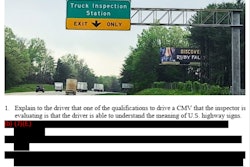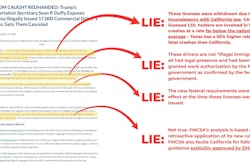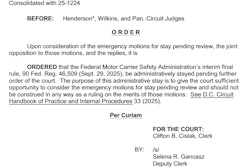The U.S. Department of Transportation's emergency rulemaking that seeks to push nearly 200,000 non-domiciled CDL drivers out of commercial work suffered another legal defeat on Thursday, Nov. 13.
After the U.S. Court of Appeals for the District of Columbia Circuit on Monday paused the rule, on Thursday it went a step further, granting the plaintiff's emergency motions for stay.
"The administrative stay, issued on Monday, was a temporary hold on the rule while the court of appeals considered our emergency motion to stay the rule," said Wendy Liu, an attorney at Public Citizen Litigation Group, which brought the case.
"The D.C. Circuit has now granted our emergency motion. That means that the rule is now on hold, and not in effect, for the months that it will take for the lawsuit to be litigated," she said.
The DOT's Federal Motor Carrier Safety Administration on Monday responded to the court's initial pause of the rule, saying that "until further notice, States are not prohibited from issuing non-domiciled CDLs and commercial learner’s permits."
Ultimately, the court's panel of judges found the plaintiffs, including two owner-operators and unions representing teachers and government workers, "have demonstrated that they are likely to succeed in at least three of their challenges to respondents’ interim final rule," according to court filings.

The court found the plaintiffs "will likely succeed" on the claim that FMCSA "improperly issued the rule" without without prior “consultation with the States," as required by federal law.
DOT and FMCSA in the rulemaking said that the rule wouldn't be costly to the states, and that a consultation on the matter wouldn't be practical. An audit of non-domiciled CDL issuance in the U.S. has been ongoing since President Donald Trump's April executive order mandated it, along with English language proficiency for all commercial drivers.
[Related: Six states issuing CDLs 'not consistent with federal regulations': What's going on]
The court said the FMCSA "rationale is plainly flawed," because federal rules around CDLs only mention the requirement to consult with states, and don't make exceptions for rules that won't cost the states much or would take a long time to discuss.
The court also knocked DOT/FMCSA for admission that it doesn't have sufficient evidence that non-domiciled CDL drivers are a public safety threat. DOT's rulemaking conceded as much, and instead of using statistical data highlighted five horrific deadly crashes caused by non-domiciled CDL drivers.
According "to the FMCSA’s own data, non-domiciled CDL holders account for approximately five percent of all CDL holders but only about 0.2 percent of fatal crashes," the court wrote, citing the five crashes and comparing that to an FMCSA estimate of 2,399 fatal crashes involving large trucks and buses this year as of September 26, 2025.
[Related: Non-domiciled CDL drivers say DOT’s new rule violates their civil rights]
The court's reading of the situation also led it to believe that less-experienced drivers would replace current non-domiciled CDL drivers.
In the rulemaking, which explicitly seeks to prevent nearly 200,000 non-domiciled CDL drivers from renewing their licenses, FMCSA anticipated that the foreign drivers "will exit the market within approximately two years as their credential comes up for renewal, and that the market will respond to this change in capacity as it has in the past, with rates adjusting and drivers and carriers entering the market where needed."
The court noted that, "given the FMCSA’s anticipation that less-experienced drivers would replace the non-domiciled ones forced out of the market, it does not appear to have shown that the rule would produce any net safety benefit."
Finally, the court found it's likely the lawsuit will succeed in proving FMCSA acted "arbitrarily and capriciously in issuing the rule." Not only did DOT fail to articulate how the rule will improve safety, it also failed to consider the harm the rule does to non-domiciled CDL holders, according to the court.
DOT's rulemaking noted non-domiciled drivers could find other work in trucking at a minimal cost, but provided no evidence, the court wrote.
Even though DOT in its response to the lawsuit asked the court to treat different groups of immigrants separately -- for instance, ruling on the merits of CDLs for longtime and legal residents of the U.S. separately from the merits for recent arrivals like asylum seekers -- the court declined.
There is, however, a sliver of hope for DOT's rule. Circuit Judge Karen LeCraft Henderson disagreed with the rest of the judges and issued a dissenting opinion.
Henderson "raised an alarm over the increasing trend of litigants asking us to decide complex, novel and controversial questions via emergency stay motions." Deciding first on blocking the rule and then weighing the actual merits of the case months later is "particularly inappropriate here," she added, preferring rather that the court expedite "our review of the merits."
Henderson did not find it likely the lawsuit would succeed in finding the petitioners, like named plaintiff owner-operator Jorge Rivera Lujan, could prove "irreparable harm" and that stopping the rule was in the public interest.
Furthermore, that judge found it reasonable that DOT would issue the rule under emergency circumstances without first posting advance notice and allowing comments, putting stock in FMCSA's statement that warning the rule could cause a "concentrated surge" of non-domiciled CDL applicants.
Henderson did find FMCSA put forth sufficient evidence not only of non-domiciled drivers lacking safety, but also that they don't meet licensing requirements that ask for applicants' driving records.
"It should go without saying that our Nation’s roadways are safer the fewer people there are operating eighteen-wheelers, buses and delivery trucks with unchecked driving histories," Henderson wrote.
For now, the court has only evaluated a few dozen pages of written arguments from the plaintiffs and DOT/FMCSA. You can read those legal filings here (from the petitioners) and here (from DOT/FMCSA).
DOT will have to wait for its day in court to get into the detailed arguments and actual litigation to weigh the merits of the case. States, if they choose, can now resume issuing non-domiciled CDLs.
As Henderson notes, the questions around non-domiciled CDL issuance are complicated, and a new one for the D.C. court. Importantly, the lawsuit did not come from any trucking organization, rather from labor groups and civil rights litigators.
Drivers, do you support DOT's move to ban non-domiciled CDLs for nearly 200,000 non-citizen drivers? If you haven't yet, weigh in via Overdrive's survey below.










